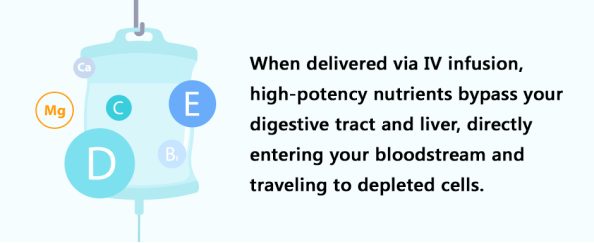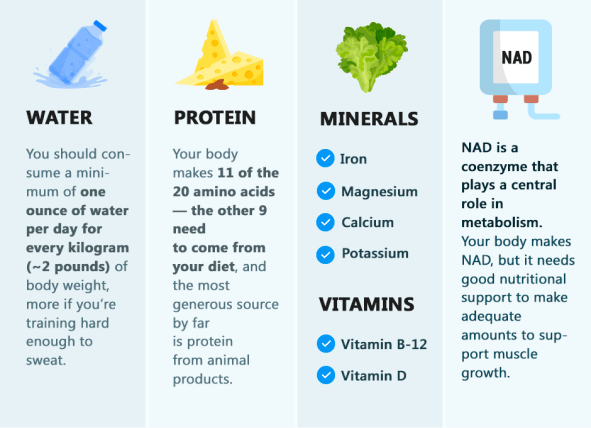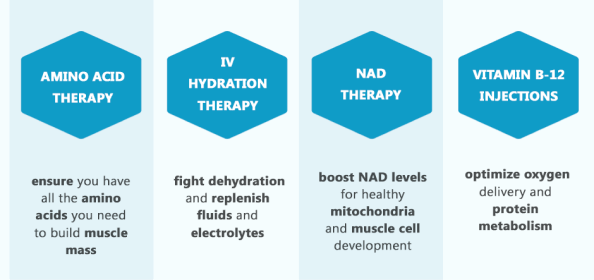
Building muscle mass is hard work, demanding several hours of training in the gym each week, pushing your muscles to the max. It can take months to hit your goals for strength and size, and even longer if your diet is deficient in certain nutrients. In fact, overtraining without adequate nutritional support can actually cause muscle tissue to break down.
Learn how Vitamin IV therapy for muscles can help accelerate the growth of strong and high-performing muscle fibers, to help you reach your goals.
Optimizing Nutrition for Muscle Development
A nutrient-dense diet is a good foundation for healthy muscles, but modern agriculture depletes natural elements in the soil and uses fertilizers to accelerate the growing process, meaning your fruits and vegetables may not deliver all the micronutrients you need. On top of that, most people do not eat enough high-quality animal products to satisfy the protein requirements for building muscle tissue.
Oral nutritional supplements in the form of pills and powders can help bridge the gap, but they must be broken down in your digestive tract and absorbed by your liver before nutrients are released into your bloodstream. In the process, much of their potency is lost, and sometimes vitamin pills pass right through your system without ever being broken down. In addition, overloading your system with supplements can cause serious damage to your liver.

When delivered via IV infusion, high-potency nutrients bypass your digestive tract and liver, directly entering your bloodstream and traveling to depleted cells. When combined with a well-designed training program, good sleep habits and a nutrient-dense diet, IV vitamins for building muscle can significantly improve the quality and performance of your muscle cells.
What Makes Healthy Muscle Cells?
Understanding the makeup of muscle fibers can help you develop an effective training and nutrition program that yields optimal results. Every muscle fiber is a single cell, with a complex network of micro structures, driven by a coordinated series of chemical interactions.
Nutrients that significantly impact muscle growth include:
Water
Muscle tissue is 75% water. If you are not adequately hydrated, you will have a hard time building muscle mass, since water contributes significantly to muscle volume. You should consume a minimum of one ounce of water per day for every kilogram (~2 pounds) of body weight, more if you’re training hard enough to sweat.
Protein
Amino acids are the building blocks of protein, and muscle tissue is composed of 20 amino acids. They are organic compounds containing amino and carboxylate, and each amino acid has its own specific side chain. Your body makes 11 of the 20 amino acids — the other 9 need to come from your diet, and the most generous source by far is protein from animal products.

Minerals
Without adequate amounts of the following minerals, you cannot achieve optimal muscle function:
- Iron is needed for your body to make hemoglobin, the protein used by your red blood cells to transport oxygen. Your muscles need oxygen to metabolize carbs and fats, to make ATP for muscle contraction.
- Magnesium helps your muscles to relax and prevents muscle cramps. It can aid in reducing delayed onset muscle soreness (DOMS) after heavy training.
- Calcium plays a critical role in the chemical cascade that triggers muscle contraction. Without calcium, your heart muscle would not be able to contract. Your body needs calcium to make ATP, the energy molecule.
- Potassium is an important electrolyte that helps to conduct signals from your brain to your muscles, telling them when and how much to contract. It also plays a key role in transporting water and nutrients to your muscles.
Vitamins
- Vitamin B-12 is a major component of red blood cells that transport oxygen and nutrients to your muscles. It helps your body metabolize protein to build muscle.
- Vitamin D helps your body to manufacture growth hormones like testosterone that your body uses to build muscle.
Nicotinamide adenine dinucleotide (NAD)
NAD is a coenzyme that plays a central role in metabolism. All living cells need NAD to survive. NAD is fundamental to healthy mitochondria, organelles that are the powerhouses of muscle cells where fats and carbohydrates are converted to fuel. Your body makes NAD, but it needs good nutritional support to make adequate amounts to support muscle growth.
IV Therapy for Muscle Growth and Development
Getting all the nutrients you need to build muscle mass from the typical American diet is impossible. In addition to getting rid of sugar, fast food and all processed foods, you need to significantly increase the amount of fresh organic vegetables you eat. You also need to ingest large amounts of clean organic protein from red meat, fish, poultry and eggs.
IV therapy for muscles provides a convenient and effective way to supplement your diet with muscle-building nutrients. It delivers high-potency nutrients directly to your bloodstream, without upsetting your GI tract or overtaxing your liver.

Try these IV cocktails and injection therapies to support muscle growth and repair:
Get the Best IV Therapy for Muscles in NYC
If you live or work in New York, InVita Wellness on Broadway is the clinic of choice for nutrient IV therapy. Relax in our Invita Lounge as high-potency nutrients are infused, drip-by-drip, while you work, surf the web, scroll social media, or even grab a nap! Contact InVita Wellness today, and get the nutritional support you need for packing on high-quality lean muscle mass and reaching your fitness goals.
Resources
Lorenzo, Isabel, Mateu Serra-Prat, and Juan Carlos Yébenes. “The role of water homeostasis in muscle function and frailty: a review.” Nutrients 11.8 (2019): 1857.